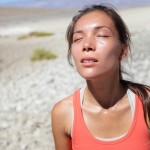 Caution: Heat Exhaustion
Caution: Heat Exhaustion
Ah, the warm weather is finally here—after a very long, terribly cold winter. Now all I want to do is be out-of-doors. And with that, for me, will come walking, biking, hiking, and hopefully some kayaking. For others, you will “hit the ground running”, jumping, and playing all manner of sports. But a warm, sunny day can turn into a deadly day if we do not take precautions.
The effect that temperature has on our bodies can be altered dramatically if high heat is accompanied by humidity. Extra moisture in the air inhibits the amount of “sweat evaporation” that can occur from our skin’s surface—our God-designed cooling process. Without the ability to cool the skin’s surface, your body’s internal temperature can quickly rise to unsafe levels. One way to keep from overheating is to apply cool packs or wet wraps to your neck/head.
Secondly, adequate hydration is critical: before, during and after outdoor activity. Water is good to drink, but when physical activity is extreme or prolonged, beverages containing crucial salts and electrolytes are important to replenish the body’s blood chemistry. If your frequency of urination is significantly diminished or if the shade of your urine darkens to a strong yellow, increase the amount of fluid you are consuming.
Another component of staying cool is to use the principle of shade—which can lower the temperature by 10-20 degrees! Take breaks in the shade, wear a brimmed hat to shade your face, and use a “sun”brella if sitting out in the sun as a spectator, or while waiting your turn to play.
Serious signs that you have had too much sun/heat include: a dry/swollen tongue, headache, muscle cramps, dizziness, mental confusion, or irritability. Furthermore, if your skin has stopped sweating and instead is cool and dry, or even shriveled to the touch—you are in severe trouble, my friend. Take heed, and if in question, take off the nearest emergency department!